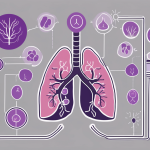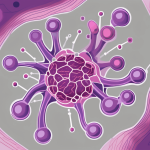Metastatic lung cancer, also known as stage IV lung cancer, occurs when cancer cells spread from the lungs to other parts of the body. This guide provides valuable insights into the causes, symptoms, diagnostic procedures, and treatment options for this challenging condition. Understanding the process of metastasis, genetic and environmental risk factors, and available treatment modalities, including surgery, radiation therapy, chemotherapy, and targeted therapies, is crucial for patients and their loved ones. With advancements in medical research and personalized treatment approaches, there is hope for improved outcomes and prolonged survival rates for individuals living with metastatic lung cancer. By staying informed, seeking support from healthcare professionals, and maintaining a positive mindset, patients can navigate this journey with strength and resilience.
If you or a loved one has recently been diagnosed with metastatic lung cancer, it’s important to gather as much knowledge as possible to better understand the causes, symptoms, and available treatment options. This comprehensive guide aims to provide you with valuable information and insights into this challenging condition. By gaining a deeper understanding, you will be better equipped to navigate this journey and make informed decisions along the way.
What is Metastatic Lung Cancer?
Metastatic lung cancer, also known as stage IV lung cancer, occurs when cancer cells from the lungs spread to other parts of the body through the bloodstream or lymphatic system. It is a progression of the disease, where the cancer has advanced beyond the initial site of origin.
Definition and Overview
Metastatic lung cancer involves the spread of abnormal cells from the lungs to distant organs like the brain, liver, bones, or other areas in the body. This form of cancer can be challenging to treat, as it requires a comprehensive approach targeting both primary and secondary tumor sites.
When cancer cells break away from the primary tumor in the lungs, they enter the bloodstream or lymphatic system, allowing them to travel to different parts of the body. Once these rogue cells reach a new location, they can start forming new tumors, a process known as metastasis.
Metastatic lung cancer is a complex disease that requires a multidisciplinary approach for effective management. Treatment depends upon the parts of the body where the cancer cells have reached, and options may include surgery, radiation therapy, chemotherapy, targeted therapy, immunotherapy, or a combination of these modalities. The choice of treatment depends on various factors, such as the location and size of the metastases, the overall health of the patient, and the presence of specific genetic mutations. Advances in medicine have made lung cancer much more manageable in the recent past. Though Stage 4 sounds terrifying, targeted therapy for lung cancer may mean a much longer and healthier life than what was ever possible in the past.
One of the challenges in treating metastatic lung cancer is that it can often be asymptomatic in its early stages, making it difficult to detect. Symptoms may only become apparent when the cancer has spread to other organs. Common symptoms of metastatic lung cancer may include persistent cough, shortness of breath, chest pain, unexplained weight loss, fatigue, bone pain, or neurological symptoms, depending on the organs affected.
Early detection and diagnosis of metastatic lung cancer are crucial for improving treatment outcomes. Regular screenings, such as chest X-rays, computed tomography (CT) scans, or positron emission tomography (PET) scans, may be recommended for individuals at high risk, such as long-term smokers or those with a family history of lung cancer.
It is important for individuals diagnosed with metastatic lung cancer to work closely with a team of healthcare professionals, including oncologists, radiologists, surgeons, and supportive care specialists. This multidisciplinary approach ensures that all aspects of the disease, including physical, emotional, and psychological well-being, are addressed.
Research and clinical trials are ongoing to develop new and more effective treatments for metastatic lung cancer. These advancements aim to improve survival rates and quality of life for patients living with this challenging disease.
The Process of Metastasis
Understanding the process of metastasis is crucial in comprehending how cancer spreads. Cancer cells can detach from the primary tumor and enter the bloodstream or lymphatic system, allowing them to travel to other parts of the body. Once these rogue cells reach a new location, they can start forming new tumors, a process known as metastasis.
Metastasis is a complex and multifaceted process involving several steps. First, cancer cells must acquire the ability to invade nearby tissues and break through the walls of blood vessels or lymphatic vessels. This process, known as local invasion, allows the cancer cells to enter the circulation and travel to distant sites.
Once in the bloodstream or lymphatic system, cancer cells face numerous challenges. They must survive the turbulent flow, evade the immune system, and find a suitable environment to settle and grow. The process of cancer cells leaving the circulation and establishing themselves in a new organ is called extravasation.
After extravasation, cancer cells undergo a series of changes to adapt to their new surroundings. They may interact with the local tissue cells, stimulate the growth of new blood vessels to ensure a blood supply, and evade the immune system’s surveillance mechanisms. These adaptations enable the cancer cells to form new tumors and continue their growth and proliferation.
Metastatic lung cancer can spread to various organs, with common sites of metastasis including the brain, liver, bones, adrenal glands, and lymph nodes. The specific pattern of metastasis can vary from person to person, depending on factors such as the tumor’s characteristics and the individual’s immune response.
Understanding the process of metastasis is essential for developing targeted therapies that can disrupt the various steps involved. Researchers are actively investigating novel treatment strategies that aim to inhibit cancer cell invasion, disrupt the formation of new blood vessels, and enhance the immune system’s ability to recognize and eliminate metastatic cells.
Overall, metastatic lung cancer is a complex and challenging disease that requires a comprehensive approach to treatment. Ongoing research and advancements in medical science offer hope for improved outcomes and better quality of life for individuals living with metastatic lung cancer.
Causes of Metastatic Lung Cancer
Metastatic lung cancer can have various causes, including genetic factors and lifestyle/environmental influences. While some risk factors are beyond our control, there are proactive steps we can take to reduce the risk of developing this aggressive form of cancer.
Genetic Factors
Genetic factors play a role in the development of metastatic lung cancer. Some individuals may possess genetic mutations that make them more susceptible to cell abnormalities and cancerous growth. It is essential to be aware of your family history and discuss it with your healthcare provider to evaluate your risk level and determine appropriate screening measures.
Lifestyle and Environmental Factors
Certain lifestyle and environmental factors can increase the likelihood of developing metastatic lung cancer. Prolonged exposure to tobacco smoke, whether through smoking or secondhand smoke, significantly increases the risk. Additionally, exposure to toxic substances and air pollution may contribute to the development of this disease.
Recognizing the Symptoms
Early detection of metastatic lung cancer is crucial for successful treatment. Recognizing the symptoms can help you seek medical attention promptly and increase the chances of a positive outcome. It is essential to be vigilant and attentive to any changes in your body.
Early Warning Signs
At the early stages, metastatic lung cancer may not exhibit noticeable symptoms. However, some individuals may experience a persistent cough, shortness of breath, chest pain, unexplained weight loss, fatigue, or recurring respiratory infections. If you experience any of these symptoms or have concerns, do not hesitate to consult with your healthcare provider.
Advanced Stage Symptoms
As the cancer progresses, patients may develop more severe symptoms such as bone pain, neurological issues, jaundice, or anemia. It is paramount to understand that these symptoms can vary from person to person. Regular check-ups and open communication with your healthcare provider are crucial for early detection and timely intervention.
Diagnostic Procedures for Metastatic Lung Cancer
Accurate diagnosis is critical for determining the most appropriate treatment approach for metastatic lung cancer. Several diagnostic procedures and tests are available to evaluate the extent and characteristics of the cancer.
Imaging Tests
Imaging tests like X-rays, CT scans, MRI scans, and PET scans help visualize the affected areas and evaluate the spread of cancer. These methods provide valuable information to oncologists, enabling them to make informed decisions regarding treatment pathways.
Biopsy and Pathology
A biopsy, which involves the removal and examination of tissue samples, is often necessary to confirm the presence of metastatic lung cancer. Pathologists analyze these samples, providing important insights into the nature and behavior of the cancer cells. This information guides treatment decisions and helps predict prognosis.
Treatment Options for Metastatic Lung Cancer
Advancements in medical science have led to a broad range of treatment options for metastatic lung cancer. The appropriate treatment approach depends on many factors, including the extent of the disease, overall health, and individual preferences.
Surgical Interventions
Surgery may be an option for some patients with localized metastatic lung cancer. Procedures like lung resection or removal of isolated metastatic tumors can improve outcomes by eliminating cancerous cells from the body. However, surgical interventions may not always be feasible or deemed appropriate, depending on the specific circumstances.
Radiation Therapy
Radiation therapy utilizes high-energy beams targeted at specific areas to destroy cancer cells and reduce tumor size. It can be used as the primary treatment modality or in combination with surgery or chemotherapy. Radiation therapy can offer symptom relief, improve quality of life, and potentially extend survival rates for metastatic lung cancer patients.
Chemotherapy and Targeted Therapies
Chemotherapy, the use of drugs to kill cancer cells, is a common treatment option for metastatic lung cancer. It can be administered orally or intravenously and aims to kill cancer cells throughout the body. Targeted therapies, on the other hand, focus on specific genetic mutations or characteristics of cancer cells and can be highly effective in some cases. Understanding these mutations is crucial for the advancement of personalized medicine in lung cancer treatment. A few key mutations that may be possible are:
1. Epidermal Growth Factor Receptor (EGFR) Mutations :
EGFR mutations are among the most common genetic alterations in lung cancer, particularly in non-small cell lung cancer (NSCLC). These mutations lead to abnormal activation of the EGFR pathway, promoting cancer cell growth and survival. EGFR-targeted therapies, like tyrosine kinase inhibitors, have been developed, significantly improving treatment outcomes for patients with these mutations.
2. Anaplastic Lymphoma Kinase (ALK) Rearrangements :
ALK rearrangements are another important genetic alteration in NSCLC. They result in the abnormal fusion of the ALK gene with other genes, leading to uncontrolled cell growth. ALK inhibitors have shown remarkable efficacy in treating patients with ALK-positive lung cancer.
3. KRAS Mutations :
KRAS mutations are common in lung cancer, particularly in smokers. These mutations are associated with poor prognosis and have been challenging to target therapeutically. Recent advancements, however, have led to the development of new drugs targeting specific KRAS mutations.
4. ROS1 Rearrangements :
Similar to ALK rearrangements, ROS1 gene fusions are implicated in a small subset of NSCLC. Patients with ROS1 rearrangements respond well to specific tyrosine kinase inhibitors, underlining the importance of genetic testing in lung cancer.
5. BRAF Mutations :
BRAF mutations, though less common, are significant in NSCLC. Specific mutations in the BRAF gene can be targeted with combination therapies, offering new treatment avenues for affected patients.
6. MET Exon 14 Skipping Mutations :
These mutations lead to skipping of exon 14 in the MET gene, causing increased MET activity and cancer cell growth. New therapies targeting MET exon 14 are showing promise in clinical trials.
7. HER2 Mutations :
HER2 mutations, while more commonly associated with breast cancer, also occur in lung cancer. These mutations can be targeted with drugs initially developed for breast cancer, providing additional treatment options.
The discovery of these mutations has revolutionized lung cancer treatment, moving away from a one-size-fits-all approach to more personalized strategies. Molecular testing to identify these mutations is now a standard part of lung cancer diagnosis and management, allowing for more effective and targeted treatment regimens. Ongoing research continues to unveil new mutations and therapeutic targets, offering hope for improved outcomes in lung cancer patients.
Remember, everyone’s situation is unique, and treatment decisions should be made in consultation with a multidisciplinary team of healthcare professionals. With advancements in medical research and personalized therapies, there is hope for improved outcomes and prolonged survival rates for metastatic lung cancer patients.
This guide serves as a starting point on your journey to understanding metastatic lung cancer. By arming yourself with knowledge, seeking support from your healthcare providers, and maintaining a positive mindset, you can navigate this challenging experience with strength and resilience.






